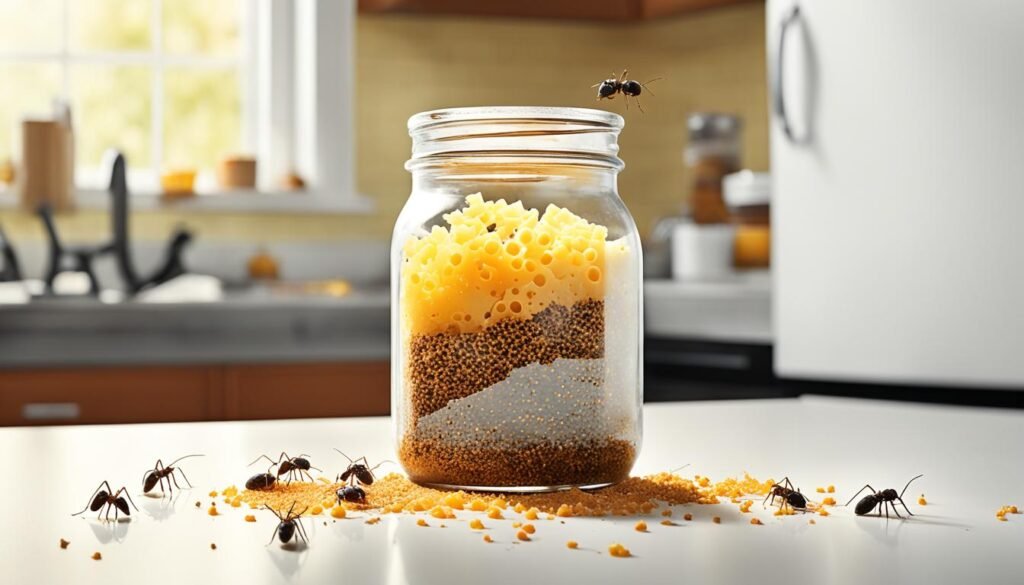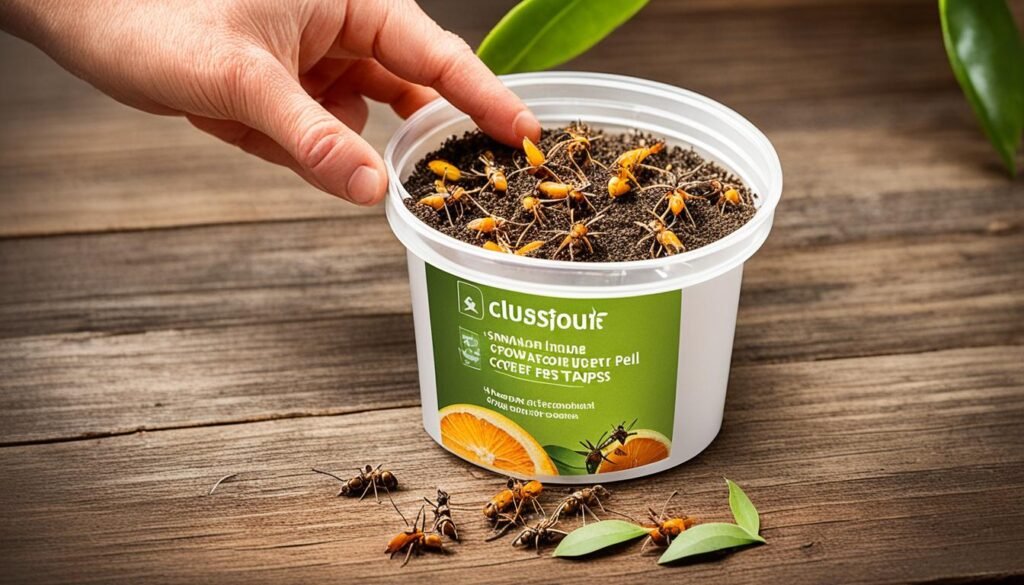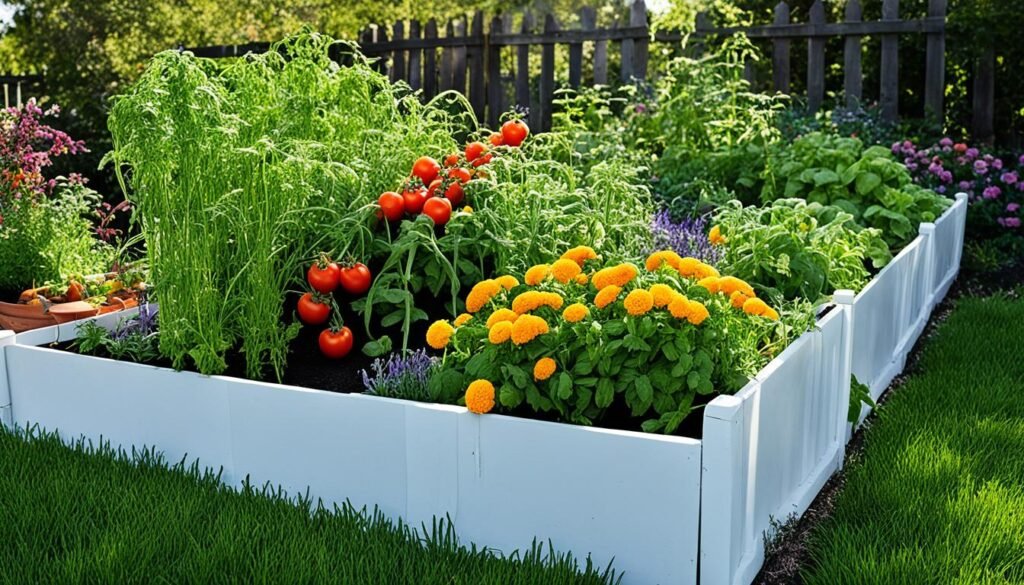Table of Contents
- Understanding the Importance of Eco-Friendly Pest Management
- Common Household Pests and Their Impact
- The Science Behind Natural Pest Deterrents
- Creating a Pest-Resistant Home Environment
- Organic Pest Control Methods for Indoor Spaces
- Eco-Friendly Outdoor Pest Management Techniques
- Companion Planting for Natural Pest Control
- DIY Natural Pest Control Sprays and Solutions
- Beneficial Insects: Nature’s Pest Control Allies
- FAQ
- What are the benefits of using natural pest control methods?
- How can I identify common household pests?
- What are some plant-based pest repellents?
- How can I make my home less attractive to pests?
- What are some effective indoor pest control methods?
- How can I protect my garden from pests organically?
- Can you share some DIY natural pest spray recipes?
Ever wondered if you could get rid of bugs without hurting the planet? I’ve looked into organic pest control and found many eco-friendly solutions that work great. These methods are not just a trend; they’re a smarter way to keep our homes bug-free while protecting our planet.
Using harsh chemicals isn’t the only way to fight pests. There’s a world of clever, earth-friendly ways to deal with them. From plant-based repellents to smart traps, these methods get rid of pests without harming our health or wallets.
Exploring natural pest control has shown me how we can make our homes pest-resistant without toxic sprays. These eco-friendly solutions are not just effective; they help us live healthier and support a greener planet.
Key Takeaways
- Organic pest control methods are effective and environmentally friendly
- Natural pest management protects family health and pet safety
- Eco-friendly solutions often prove more cost-effective than chemical alternatives
- Plant-based repellents offer powerful pest deterrence
- Creating a pest-resistant home environment is key to long-term control
Understanding the Importance of Eco-Friendly Pest Management
I’ve learned that eco-friendly pest control is essential, not just a trend. It’s amazing how these methods benefit us and the planet. Let’s see why going chemical-free is good for our lives and the environment.
Environmental Benefits of Natural Pest Control
Using safe pest solutions is a big win for our planet. Natural methods cut down on harmful chemicals in our soil and water. This keeps beneficial insects, birds, and wildlife safe. My garden does better with sustainable pest control, making a healthier place for all.
Health Advantages for Families and Pets
Chemical-free pest control is good for our health too. I’m relieved my kids and pets can play safely in our yard. Natural pest control lowers the risk of breathing problems, skin issues, and other health issues from chemicals.
Cost-Effectiveness of DIY Solutions
Safe pest solutions can be affordable. Many natural remedies use items from our homes, saving money. By stopping pests from damaging my home and garden, I save on repairs. It’s a smart choice that shows eco-friendly pest control is both effective and budget-friendly.
Common Household Pests and Their Impact
I’ve seen many unwanted guests in homes across the United States. Household pests can be a big problem, causing damage and health risks. Let’s look at some common pests and their effects.

Ants are often the first pests we notice. These tiny intruders look for food in kitchens, leaving trails for others. It’s important to know which ant species you have – some are just a bother, while others can damage your home.
Cockroaches are another common issue. These tough creatures love warm, moist places and can spread germs. If you see one, there are likely more around. Keeping your home clean and sealing entry points helps prevent them.
Rodents like mice and rats can be really problematic. They chew on wires, contaminate food, and spread diseases. Look for droppings, gnaw marks, or strange noises to spot them.
- Inspect your home regularly for signs of pests
- Keep food in sealed containers
- Fix leaks and remove standing water
- Seal cracks and holes in your home’s exterior
By being careful and taking steps to prevent pests, you can keep your home safe. Remember, spotting pests early and acting fast is key to avoiding damage and health risks.
The Science Behind Natural Pest Deterrents
Natural pest control is more than a trend; it’s backed by science. It’s a way to keep our homes pest-free without harsh chemicals. Let’s explore how these eco-friendly methods work.
Plant-Based Repellents and Their Effectiveness
Plant-based pest control uses nature’s power. Many plants have compounds that pests don’t like. For instance, marigolds keep mosquitoes and aphids away.
By planting these around my garden, I create a barrier against pests. It’s a natural way to keep my garden safe.
Essential Oils as Pest Control Agents
Essential oils are another natural way to fight pests. Peppermint oil keeps ants away, while citronella repels mosquitoes. I mix a few drops with water for a spray bottle.
This DIY repellent confuses pests, making my home less inviting to them. It’s a simple yet effective way to keep pests away.
Biological Control Methods in Home Settings
Biological control uses natural predators to control pests. I’ve added ladybugs to my garden to eat aphids. This approach helps keep pest numbers in check without chemicals.
It’s amazing to see nature balance out the ecosystem. This method is good for my garden and the environment.
Learning about these methods has helped me create a safe, eco-friendly pest control system. Natural repellents protect my family and keep our garden healthy.
Creating a Pest-Resistant Home Environment
A pest-proof home begins with smart preventive pest control. By focusing on maintenance, I’ve kept pests away. Let’s look at some effective ways to make your home pest-resistant.
Cleanliness is vital in keeping pests away. I always clean up food spills quickly and store food in airtight containers. Keeping your pantry clean also helps. Regular trash removal and sealed outdoor bins are also important steps.
Sealing entry points is key to a pest-proof home. I check my house for cracks and gaps around walls, windows, and doors. Using caulk or weatherstripping to seal these spots has really helped in keeping pests out.
Managing moisture is also crucial for pest control. I fix leaky pipes quickly and ensure good airflow in damp areas like bathrooms and basements. This stops pests that love damp places.
- Keep kitchen counters and floors clean
- Store firewood away from the house
- Trim bushes and trees near your home
- Use screens on windows and doors
By following these steps, I’ve made my home pest-resistant and eco-friendly. Remember, regular maintenance is key to keeping your home pest-free for a long time.
Organic Pest Control Methods for Indoor Spaces
I’ve discovered some excellent organic pest control methods for indoor spaces. These methods are safe and effective. They help you deal with common household pests without harsh chemicals.

Natural Traps and Baits
Natural pest traps are a clever way to manage pests indoors. I prefer using sticky traps with non-toxic adhesive to catch crawling insects. For flying pests, I put out bowls of apple cider vinegar with a drop of dish soap.
The smell draws them in, and the soap traps them by breaking the surface tension.
Diatomaceous Earth: A Versatile Pest Solution
Diatomaceous earth is my top choice for indoor pest control. It’s a fine powder that’s safe for humans but deadly for insects with exoskeletons. I sprinkle it along baseboards, under appliances, and in cracks where pests might enter.
It’s very effective against ants, roaches, and bed bugs.
Vinegar and Baking Soda Remedies
I often turn to vinegar and baking soda for pest control. A spray bottle with equal parts water and white vinegar keeps ants and spiders away. For tough spots, I mix baking soda and water to make a paste.
I apply it to entry points. These simple ingredients are great for keeping my home pest-free naturally.
Eco-Friendly Outdoor Pest Management Techniques

Garden pest control doesn’t have to be bad for the planet. Eco-friendly methods can keep your outdoor areas healthy without using harsh chemicals. Let’s look at some natural ways to prevent pests that are great for organic lawn care.
One good method I use is companion planting. I put pest-repelling plants near the ones that pests might harm. Marigolds, for instance, keep many garden pests away with their strong smell. This not only protects my plants but also makes my garden look better.
Keeping the soil healthy is also key to fighting pests naturally. I use organic lawn care like composting and mulching. These improve soil quality, making plants stronger against pests. They also draw in beneficial insects that eat the bad pests.
Here are some other eco-friendly techniques I’ve tried and found to work:
- Handpicking larger pests like caterpillars and beetles
- Setting up physical barriers such as row covers or netting
- Using organic sprays made from neem oil or garlic
- Encouraging natural predators like birds and beneficial insects
By using these methods, I’ve cut down on pests in my garden and kept the ecosystem healthy. It’s good for my plants and the planet!
Companion Planting for Natural Pest Control
I’ve found companion planting to be a game-changer in my garden. This method pairs plants to repel pests and boost growth naturally. Let’s explore some effective strategies.
Best Plants to Repel Common Garden Pests
Certain plants are superheroes in the garden. Marigolds keep aphids and nematodes away. Nasturtiums lure pests away from my veggies.
Basil keeps mosquitoes and flies away while adding flavor to my dishes.

Strategic Plant Placement for Maximum Effectiveness
Placement is key in companion planting. I plant aromatic herbs like rosemary and thyme near my veggies. Their strong scents confuse pests.
Tall plants like sunflowers create barriers. They protect smaller plants from wind and pests.
Dual-Purpose Plants: Beauty and Pest Control
Many plants repel pests and add beauty to the garden. Lavender repels moths and flies and adds purple color. Chrysanthemums contain pyrethrin, a natural insecticide, and bring vibrant color.
By choosing these plants, I create a beautiful, pest-resistant garden without harsh chemicals.
Companion planting has changed my gardening. It’s eco-friendly and cost-effective for managing pests. It also makes my garden more beautiful and productive. Give it a try – your plants will thank you!
DIY Natural Pest Control Sprays and Solutions
I love making my own pest sprays at home. They’re simple, save money, and don’t have harsh chemicals. Let’s check out some easy organic pest control recipes you can make in your kitchen.
A garlic spray is one of my top natural pesticides. I mix garlic cloves with water and let it sit overnight. After straining, I add a bit of liquid soap. This spray is great for aphids and small bugs.
Neem oil spray is another great option. I combine neem oil, water, and a bit of liquid soap in a quart. It’s perfect for fighting off mealybugs and spider mites.
For flying pests, essential oils work well. A blend of peppermint, lavender, and citronella oils in water keeps flies and mosquitoes away. I spray it near windows and doors.
Here’s a simple recipe for an all-purpose pest spray:
- 1 cup water
- 1 cup white vinegar
- 1/2 cup rubbing alcohol
- 1 tablespoon liquid dish soap
Just mix everything in a spray bottle and shake it well before using. It’s good against ants, spiders, and other pests.
Always test these homemade sprays on a small area first. This makes sure they won’t harm your plants or surfaces. With these organic recipes, you can fight pests naturally and effectively.
Beneficial Insects: Nature’s Pest Control Allies
Nature has its own way to fight pests with beneficial insects. These insects are crucial for keeping pests away without using chemicals. They work hard to keep our gardens balanced.
Attracting and Maintaining Helpful Bug Populations
To get these helpful insects, I make my garden welcoming. I plant different native flowers, keep water sources clean, and don’t use pesticides. These actions help these beneficial insects stay and protect my garden.
Ladybugs, Praying Mantises, and Other Natural Predators
Ladybugs and praying mantises are great at fighting pests. Ladybugs eat aphids fast, and mantises catch bigger pests. Other insects like ground beetles, lacewings, and parasitic wasps also help control pests.
Creating a Balanced Ecosystem in Your Garden
For a garden that fights pests well, diversity is key. I focus on many types of plants, healthy soil, and less human help. This way, beneficial insects thrive, protecting my garden naturally. It’s incredible to see my garden healthy and full of life.







